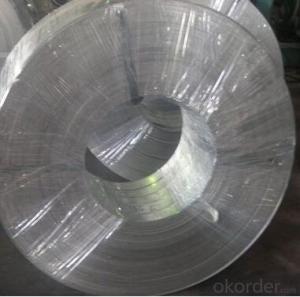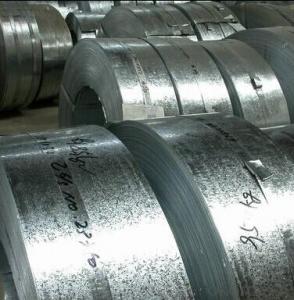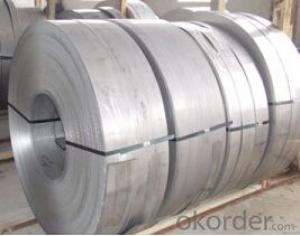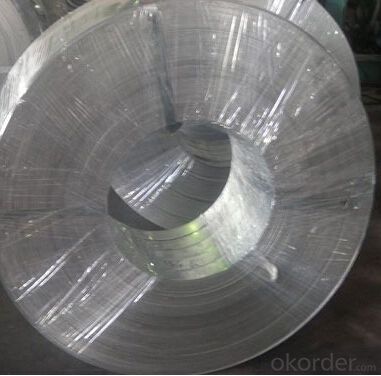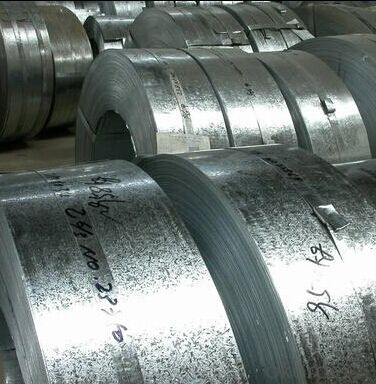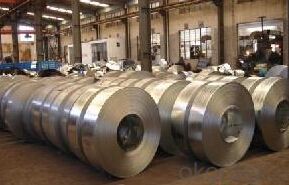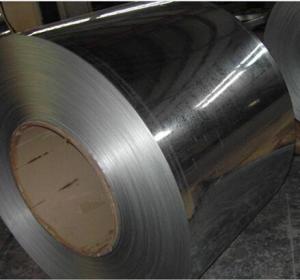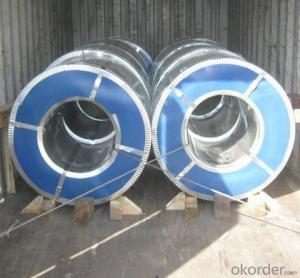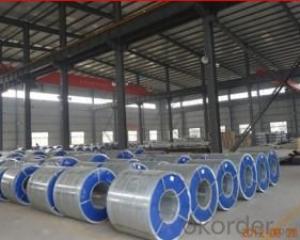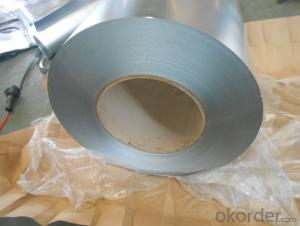Galvanized Steel Coils/ Strips for Buildings
- Loading Port:
- Shanghai
- Payment Terms:
- TT OR LC
- Min Order Qty:
- 30 m.t.
- Supply Capability:
- 10000 m.t./month
OKorder Service Pledge
OKorder Financial Service
You Might Also Like
Basic Info.
Model NO.:SGCC, DX51D
Surface Treatment:Galvanized
Certification:SGS
Technique:Cold Rolled
Standard:ASTM, JIS, GB, DIN
Application:Container Plate
Edge:Slit edge
Steel Grade:Q195
Width:10-1250mm
Coil Weight:3-5tons
Thickness:0.18-2.0mm
Export Markets:Global
Additional Info.
Packing:Stanadrd Sea Worth
Standard:SGS
Origin:China
HS Code:72104900
Production Capacity:4000 Tons/Month
Product Description
Cold rolled steel coil/ band / strip / strap/ tape
Standard GB ASTM BS JIS DIN
Material Q195 Q235 Q345 SS400 ST 37 SAE1008 A36
Size: 0.11mm - 3.0mm
Width as your requirement from 10mm-1500mm
Package: Stanadrd sea worth or as your requirement
Coil weight: As your requirement from 50-7000kg
Quality warranty: Any third party inspection is accepted.
Quality Certificate: MTC Mill orioginal and others as your requirement.
Commodity | Galvanized Steel Coils |
Thickness | 0.12mm-5mm |
Width | 600-1500mm |
Zinc mass | 40-275 gsm |
Coil Weight | 3-8 tons |
Standard | ASTM, AISI, GB, JIS, DIN |
Grade | Q195-Q345, SGCC, SPCC, SPHC, DC51D, DX51D, DX52D, SS grade 33-80, DX 54D |
Spangle | Big Spangle, Small Spangle, Regular Spangle, Zero Spangle |
Payment | T/T, L/C |
MOQ | 30 tons |
Packaging | Seaworthy standard packaging or as customed |
Delivery | 10-20 days after receiving the prepayment |
- Q: How are steel coils used in the packaging industry?
- Steel coils are used in the packaging industry primarily for the production of metal strapping and seals. These coils are unwound and processed to create strong and durable strapping materials that are used to secure and bundle various types of packaging, such as boxes, crates, and pallets. The steel coils provide excellent tensile strength and resistance to breakage, making them ideal for ensuring the safe transportation and storage of goods.
- Q: 7850kg/cu.m density is typical for all type of steel? like reibar, I- beam and so on
- 90% of the steels used today are plain mild carbon steels consisting of iron with less than 1% carbon content and as such have a density of about 7750 kg/cubic meter. Some special steels which have a significant percentage of alloying elements such as chrome or manganese or other elements will have greater density bringing the steel up to about 8000 kg / cubic meter. There are a greater many factors influencing the exact density of a steel. Even for steels of exactly the same content of iron , carbon and other alloying elements, there may be a difference ( very small mind you ) in density due to work hardening. The difference in this case is due to movement of dislocations which become locked in the grain boundaries and this forms a more dense crystal structure. For this same reason, the theoretical density of steel (which does not take into account dislocations) is greater than the measured density of steel.
- Q: I have one and wonder how much force this can take since it does seem like you can bend it(Sure it's impossible with hands), but I don't want to try that cause i don't want to break it. Many people say that it's really hard and can handle a hammer smash? is that true and can it even make it through more force. Cause steel is harder than iron and iron is pretty hard... So how much can i trust this locks security, i mean if i put at at a door would some thiefes be able to break it, if they had the right tools??
- Have you ever watched any of the shows where people are buying lockers at storage facilities? This style lock is used quite often. The reason for the small shackle is to prevent someone from using bolt cutters. Unfortunately, if a thief has a cordless right angle grinder with the right cutting blade they will still be able to remove it. That is what the guys at most of these auctions use to remove them in 10-15 seconds.
- Q: What are the main factors that affect the formability of steel coils?
- The main factors that affect the formability of steel coils include the steel's composition, mechanical properties, thickness, temperature, and lubrication.
- Q: How do steel coils contribute to the agricultural sector?
- The agricultural sector benefits greatly from the use of steel coils in various ways. To begin with, these coils are instrumental in the production of agricultural machinery and equipment such as tractors, harvesters, and irrigation systems. These machines are indispensable for carrying out farming operations efficiently, thereby helping farmers increase productivity and cut down on labor costs. The robustness and durability of steel coils ensure the machinery's ability to endure the harsh conditions of the agricultural environment. Furthermore, steel coils find application in the construction of storage facilities and warehouses for agricultural products. To safeguard crops from damage, these structures must be strong and resistant to external elements. Steel coils provide the required strength and stability for the construction of such storage facilities, thereby ensuring the secure storage of agricultural produce. In addition, steel coils are employed in the fabrication of fencing and other agricultural infrastructure. Fencing is of utmost importance in protecting crops from animals and trespassing. Steel coils serve as a robust material for fencing, guaranteeing the security and protection of agricultural lands. Moreover, steel coils are utilized in the manufacture of irrigation pipes and systems. Efficient irrigation is crucial for the growth and yield of crops, particularly in areas with limited water resources. Steel coils are used to create pipes capable of withstanding high pressure and resistant to corrosion, thereby ensuring the effective distribution of water throughout agricultural fields. In conclusion, steel coils play a vital role in the agricultural sector, providing the necessary materials for manufacturing machinery, constructing storage facilities, fencing, and irrigation systems. The strength, durability, and resistance to harsh conditions make steel coils an essential component in enhancing agricultural productivity, protecting crops, and ensuring efficient farming practices.
- Q: steel structure
- Disadvantages Of Steel
- Q: How are steel coils used in the production of metal cladding?
- Steel coils are used in the production of metal cladding as a primary raw material. Metal cladding refers to the process of covering a building's exterior with a layer of metal, typically steel, to enhance its durability, aesthetics, and insulation properties. Steel coils serve as the starting point for the manufacturing of metal cladding. These coils are typically made of galvanized steel, which is steel coated with a layer of zinc to protect it from corrosion. The coils are unrolled and fed into a roll-forming machine, where they are shaped into the desired profile for the metal cladding panels. Once the steel coils are formed into the required shape, they undergo various processes to enhance their properties. These processes may include cutting, perforating, and embossing to create patterns, textures, or openings in the cladding panels. The coils can also be coated with additional protective layers, such as paint or powder coating, to provide additional corrosion resistance and aesthetic appeal. The shaped and processed steel coils are then assembled into metal cladding panels. These panels are designed to interlock with each other, creating a seamless and visually appealing exterior for buildings. The panels can be attached to the building's structure using various methods, such as screws, clips, or adhesives. The use of steel coils in metal cladding production offers several advantages. Steel is a strong and durable material, making it suitable for exterior applications that require resistance to weathering, impact, and other environmental factors. Additionally, steel is highly versatile, allowing for a wide range of design options and customization. In conclusion, steel coils play a crucial role in the production of metal cladding. They serve as the raw material, which is shaped, processed, and assembled into panels that provide buildings with enhanced protection, aesthetics, and insulation properties.
- Q: What are the different types of coil slitting machines?
- In the market, one can find various coil slitting machines, each designed to meet specific requirements and preferences. Some commonly used types are as follows: 1. Rotary shear slitters: These machines employ rotary knives mounted on a rotating drum to slice the coil into narrow strips. They are perfect for high-speed operations and can handle large quantities of material. 2. Loop slitters: Loop slitting machines pass the coil through a loop to maintain tension and prevent material damage during the slitting process. They are suitable for delicate materials or those prone to deformation. 3. Turret slitters: Turret slitting machines have multiple sets of slitting knives mounted on a rotating turret. This enables quick and easy switching between various slitting configurations, reducing downtime and increasing productivity. 4. Drag slitters: Drag slitting machines utilize a stationary knife and a moving clamp to hold and pull the coil through the cutting process. They are versatile and can handle a wide range of materials, including thick or heavy coils. 5. Crush slitters: Crush slitting machines employ a set of opposing rollers to crush and cut the coil material. They are commonly used for softer materials or those that are challenging to cut with traditional knives. 6. Laser slitters: Laser slitting machines make use of a high-powered laser beam to precisely cut through the coil material. They offer unparalleled accuracy and are suitable for high-end applications or materials with complex shapes. Each type of coil slitting machine has its own advantages and limitations. The choice of machine depends on factors such as the type of material, required speed, desired accuracy, and production volume.
- Q: How are steel coils used in the production of steel locks?
- Steel coils are used in the production of steel locks as they provide the raw material required to create the lock components. The coils are processed and shaped into various lock parts such as the housing, shackle, and key mechanism, which are then assembled to form the final lock product.
- Q: Have spent two days making a specialized knife out of 304 stainless steel, after throwing into a log it bent slightly arghhhh. Is it worth continuing to finish it off or start all over again with different kind of steel if so which kind should i use.
- Sorry okorder /... I hope that link works but as you can see you dont want to use 303.304.316,410,416,430 You can get away with 301 but would be best to use 440. It kind of sounds like your a home shop guy. It would be best for you to make a knife out of a1 or d2 tool steel. with these steels you can torch heat them to a red hot heat where a magnet will not stick to them. Then let them cool slowly in the air. After that you can temper in a oven around 400f. This will a very hard long lasting knife. Check OKorder for good steel prices. A1 and D2 are not stainless but they are the best for a home shop. If you go stainless you can buy preharden material but you will have to grind everything. You can also pay someone to harden your knife but dont plan on it being cheap.
Send your message to us
Galvanized Steel Coils/ Strips for Buildings
- Loading Port:
- Shanghai
- Payment Terms:
- TT OR LC
- Min Order Qty:
- 30 m.t.
- Supply Capability:
- 10000 m.t./month
OKorder Service Pledge
OKorder Financial Service
Similar products
Hot products
Hot Searches
Related keywords
